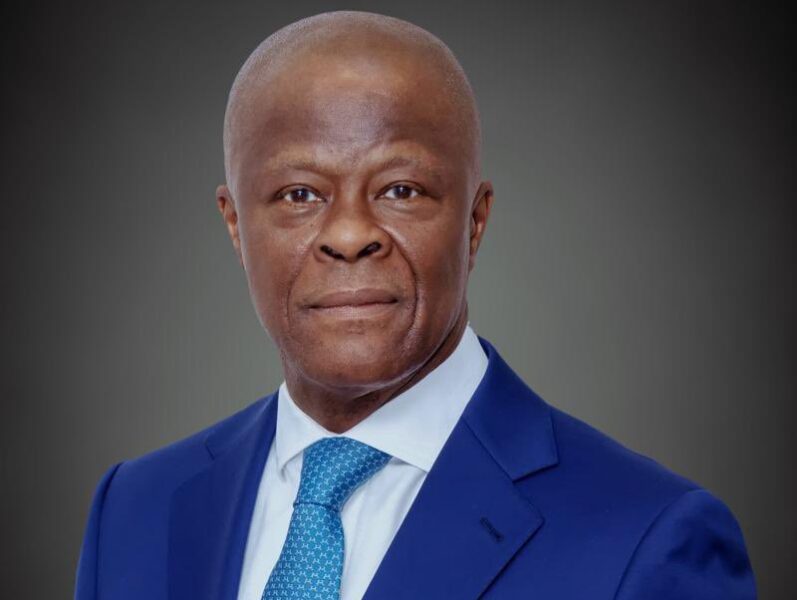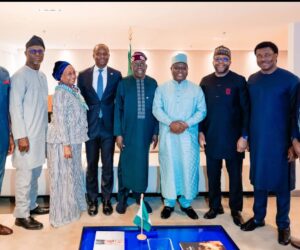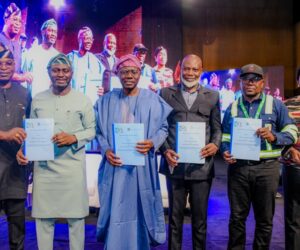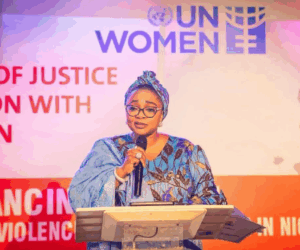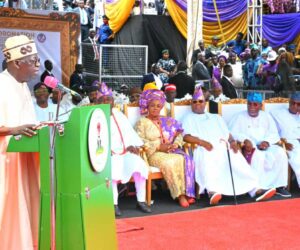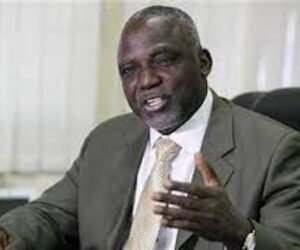• It will open access to billions of untapped funds – Ugwuoke
From Juliana Taiwo-Obalonye, Abuja
At the side event “Unlocking Climate Finance for Sustainable Growth” of the 31st Nigerian Economic Summit held in Abuja, Minister of Finance and Coordinating Minister of the Economy, Wale Edun, launched the PACE Climate Guide, emphasising climate finance as a critical opportunity and growth strategy for Nigeria’s economic future. He hailed the summit’s sustained commitment to public-private dialogue as pivotal in moving the Nigerian economy forward.
Addressing a packed audience, Edun highlighted the transformational shift under President Bola Tinubu’s leadership to a level economic playing field, where opportunities abound without the need for privileged access. “The biggest opportunity of the moment is in climate,” he declared, underscoring the urgency posed by climate change impacts already felt across Nigeria — from flooding in Lagos to drought in Sokoto and displacement in Makurdi.
Edun stressed that global climate finance flows to developing countries have lagged behind promises, with $2 trillion spent globally on climate action in 2024 yet only a fraction reaching nations like Nigeria. In response, he said his ministry established a green growth office to align Nigeria’s development with global financing trends and to harness this available capital efficiently.
He described climate finance not as charity, but as “smart capital directed towards infrastructure, innovation, technology, and people,” vital for job creation, health, education, and the well-being of future generations. The PACE Climate Guide, co-developed with the UK government and Nigerian agencies, is a practical tool to help government ministries, private companies, and communities access climate finance resources.
Outlining Nigeria’s ambitious climate programmes, Edun cited the AfDB and World Bank-backed Mission 300 to connect 300 million Africans to electricity by 2030, the Distributed Access Renewable Energy (DARE) initiative aiming to reach 17.5 million Nigerians with renewable energy, and Nigeria’s commitment to a 2060 net-zero target involving renewable energy, climate-smart agriculture, and clean mobility.
He also highlighted innovative efforts in carbon markets projected to unlock $2.5 billion in capital and create over 2 million green jobs by 2030. To maximise these opportunities, Edun said the government is embedding climate priorities into public finance management, developing green budgeting, and strengthening capacity at federal and state levels for investment-ready projects. The newly created Green Growth Finance Coordinating Union, he explained aims to align climate investments with Nigeria’s fiscal and national goals.
Edun further emphasised the need for accreditation to access international climate funds, exemplified by the Development Bank of Nigeria’s successful Green Climate Fund accreditation.
He called for coordination and transparency in climate finance and pledged Nigeria’s strong international engagement at forums like COP30 in Brazil, G20, IMF, and World Bank.
Edun concluded by affirming that effective climate finance deployment translates to electricity for students, energy access for businesses, and opportunities for young people, ultimately building a more resilient and inclusive Nigerian economy under the current administration.
On his part, Minister of Budget and Economic Planning, Atiku Bagudu, emphasised the critical role of collaborative efforts and climate financing in addressing Nigeria’s climate challenges at the launch of the PACE Climate Guide.
He highlighted the importance of support from a broad spectrum of stakeholders, including private sector participants, development partners, and government agencies, which he said has been central to the bold reforms undertaken by the Tinubu’s administration.
Bagudu pointed to the drastic environmental changes in the Sahel region, noting the shrinking of water bodies like Lake Chad and the dire consequences for populations forced to migrate due to water scarcity. He stressed that without adequate climate financing and skilled project development, the impact of climate change would worsen, driving conflicts and displacement.
He also acknowledged the complexity of Nigeria’s governance structure with its three tiers of government and underscored the diverse climate-related hardships faced by communities, such as those in oil-producing areas where fresh water is contaminated by hydrocarbons.
He noted the ministry’s commitment, mentioning a N21 billion project preparation fund set aside to support climate-related projects that can attract investment and generate solutions.
The Minister praised the partnerships and collaborations fostering skills and funding needed for effective climate response and expressed optimism that initiatives like the PACE Climate Guide will enhance Nigeria’s capacity to tackle climate challenges sustainably. He reiterated the ministry’s dedication to generating impactful projects through coordinated efforts among all stakeholders.
Also speaking, Head of Development Cooperation for the British High Commission in Nigeria, Cynthia Rowe, underlined the United Kingdom’s longstanding partnership with Nigeria and its commitment to supporting the country’s development through climate finance.
According to her, “The UK government has a really strong relationship with the Nigeria government. We’ve had decades of partnership on development, as well as other parts as well, including our people-to-people links, and one of the things that we really want to do more and more of is to be a catalyst for Nigeria’s development.”
Rowe stressed the significance of climate finance as a means for Nigeria to take control of its own development and destiny amid the pressing challenges posed by climate change. She revealed a key element introduced at the event, stating, “Well, I hope a small part of the spectacular thing is a tool kit. Basically, what we’re doing is we’re working together with the state government, as well as federal government, to understand how Nigerian states can unlock finance.”
She described the tool kit as a practical resource that enables Nigeria to assess the impact of climate change and its readiness to access billions of dollars available in climate financing. “The tool kit allows Nigeria to assess the impact of climate change, to assess its readiness to access billions of dollars that are available, and to spend them on the people of Nigeria in order to make things more climate resilient,” Rowe explained. She concluded by highlighting the importance of this initiative in helping Nigeria build resilience and better address climate challenges.
Speaking to newsmen, National Team Leader of PACE, Ifeanyi Ugwuoke, explained that the guide’s purpose is to unlock access to billions of dollars in climate finance for governments and eco-friendly businesses.
“Climate change is an existential issue that requires financing for resilient infrastructure and sustainable projects,” Ugwuoke said. “This guide highlights available funds and the conditions to access them, helping sub-national governments and businesses invest effectively in Nigeria’s climate response.”
He noted the guide will soon be accessible online, accompanied by technical assistance to enable states and businesses to assess their needs and develop responses.
Green Public Financial Management (PFM) Advisor at PACE, Chinedu Eze, highlighted opportunities for unlocking climate finance to support sustainable growth in Nigeria, particularly at the state government level.
Speaking on expanding resources beyond government budgets, Eze said, “Government resources are limited and insufficient to meet all needs. This guide helps bring additional funding to both the public and private sectors, especially eco-friendly businesses, to achieve their goals.”
He emphasised the focus on states where challenges are greater compared to federal institutions. Eze explained that a readiness assessment toolkit assists states in evaluating their institutional frameworks, legal and regulatory environment, manpower capacity, project packaging for climate finance, financial management systems, and citizen engagement mechanisms to ensure effective and transparent use of funds.
“This approach enables state governments to better access and manage climate finance for impactful implementation,” he added.
Deputy National Team Leader of PACE, Titi Fakoya, on her part stressed the importance of inclusive financing in addressing climate change for national development. She said, “The real climate challenge is money. This guide we’re launching shows how to unlock climate finance that is inclusive of gender, recognizing that climate change impacts men and women differently. It is crucial women are not left out because climate change is a threat multiplier affecting everyone unevenly.” Fakoya highlighted growing awareness and accountability in climate finance, noting it is no longer “one size fits all” and that policy and funding must reflect these differences.
Public Financial Management Advisor for PACE, Basil Obasi, explained the programme’s role in helping Nigerian states access untapped climate resources. “We point states to existing resources they are not tapping and nudge them to develop bankable projects linked to economic sustainability and green growth,” he said. Obasi added that attracting these funds would create green jobs—defined as “jobs that deliver economic growth without hurting the environment, supporting emissions reduction and a just transition.”
The launch aims to unite stakeholders from government and the private sector to raise awareness and offer support.

